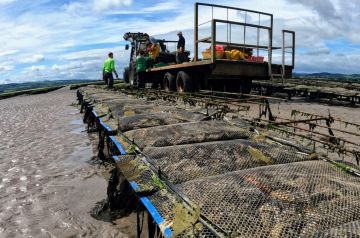As rising sea temperatures threaten our marine ecosystem, researchers are using sensors to address climate change challenges and protect our coastal environments
Researchers from South East Technological University (SETU) are working with shellfish farmers along the south coast of Ireland to help them adapt and respond to climate change using cutting-edge technologies.
Aquaculture is an important industry in Ireland worth an estimated production value of €178.9M in 2021, according to BIM. However, as global temperatures continue to rise, surface sea temperatures continue to rise also, threatening our precious marine ecosystem.
Sensors deployed in Bannow Bay and Dungarvan
The STREAM (Sensor Technologies for Remote Aquatic Environmental Monitoring) project, is part funded by the European Regional Development Fund (ERDF) through the Ireland Wales Cooperation programme with €4.3 million over five years, and is helping to address climate change challenges by collecting data to protect our coastal environments.
STREAM uses commercial sensors and is also developing innovative device technologies to monitor the marine environment, measure changes, and broadcast live data. As part of the project researchers have deployed sensors in Bannow Bay and Dungarvan in County Waterford to help better understand growing conditions and track water quality, in an effort to improve management techniques, and increase the quality and growth of oysters and mussels. These bays in particular are significant contributors to the country’s overall shellfish production.
These STREAM project sensors are capable of measuring important indicators of water quality at these shellfish growing areas such as, temperature, salinity and nutrient levels in the marine environment. This information is critical for aquaculture operators, scientists and policymakers to gain a better understanding of potential threats and implement effective management and conservation strategies in the face of climate change.
Temperature changes altering species distribution and their ecology
According to Dr Joseph O’Mahony, STREAM Principal Investigator, “The Centre for Sustainable Aquatic Research (CSAR) has been investigating the impacts of temperature change as it is "altering species distribution and their associated ecology." They have found that there can be relatively large variations in temperature preferences for some individuals within a species group but surmised that elevated temperatures can increase respiratory stress, metabolic rate and oxygen demand. They have now identified the thermal niches for four fish species in the Irish Sea. However, their distribution range will change accordingly as the climate increases sea temperature.” He added, “The STREAM project is a valuable contribution to understanding climate change and its impacts on the marine environment. The project's data and tools will be essential for protecting coastal communities and developing strategies to adapt to climate change.”
Marinestream.eu
STREAM has also developed an online portal, marinestream.eu, connecting the user community as a central hub for sharing information, related to the effects of changes on water quality. The portal facilitates collaboration among those that make their living from the sea, scientists and the general public, serving as a platform for knowledge exchange.
STREAM is in the process of developing custom toolkits to help coastal communities, fishers, and aquaculture businesses adapt to climate change. These will focus on creating a better understanding of the implications of water quality changes for groups at higher risk due to their proximity to the ocean.
The STREAM project is a collaboration between Ireland and Wales involving South East Technological University (SETU), Swansea University, and Munster Technological University. The project exemplifies the way that Ireland and Wales can use technology to address climate change, helping to build capacity in the cross-border region, which will be essential in the years to come.


